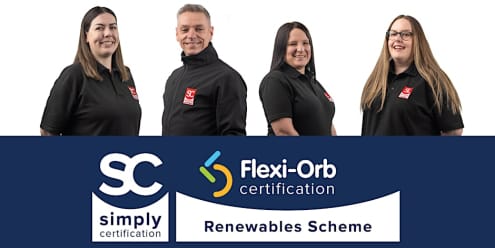The Top 3 Eco Funding Schemes

One positive of gaining PAS 2030 and MCS Certification is that it gives you access to funding schemes. These funding schemes allow more properties to be installed on, and it is more cost-effective for the homeowner. Want to find out about more positives of certification? Click here!
The need for more PAS 2030 and MCS Certified contractors is multiplying. With a target for the UK to reach Net Zero by 2050, one key requirement is to address the issue of poor energy efficiency performance in homes. Installers across the UK are hugely benefiting from investing in gaining PAS 2030 and MCS Certification alongside TrustMark registration.
Since 2006, there have been some form of funding schemes available to make homes more energy efficient, to be eligible for the relevant funding schemes the installers are required to be certified in the installation and be registered to TrustMark.
So…what are the funding schemes?
To qualify to deliver under these funding schemes, you will need to be a TrustMark registered business and hold the relevant certification for the measures or technologies that you install.
#1 ECO4 Funding
ECO4 is a government scheme that provides grants to improve the energy efficiency of homes. It is the latest iteration of the ECO scheme and is available to people living in fuel poverty or unsuitable homes. The scheme is aimed at lower-income households and provides financial assistance for energy-efficient upgrades to homes, reducing emissions, electricity, and energy bills.
To apply for ECO4 Funding as an installer, you need to follow these steps:
- Contact a Supplier: You must work with an obligated energy supplier to deliver ECO measures. These suppliers are responsible for meeting the ECO4 obligations.
- Submit Application: You can submit applications through registered installers or directly through the obligated suppliers. Some platforms, like Eco Providers, can help you with the application process.
- Follow ECO4 Guidelines: Familiarize yourself with the ECO4 guidelines and ensure you meet all the necessary criteria and standards for the measures you plan to install.
For more detailed information, you can visit the Ofgem website which provides comprehensive guidance for installers.
#2 The Social Housing Decarbonisation Fund (SHDF): Wave 2.2
This is a funding initiative aimed at improving the energy efficiency of social housing in England. The fund supports the installation of energy performance measures in social homes, helping to deliver warmer, more energy-efficient homes, reduce carbon emissions, tackle fuel poverty, and support green jobs.
Many primary contractors have been successful in securing contracts under The Social Housing Decarbonisation Fund: Wave 2.2 and require to build up their supply chain to deliver under this. This means lots of opportunities for cert holders of PAS 2030, MCS and TrustMark.
#3 Great British Insulation Scheme (GBIS)
The Great British Insulation Scheme (GBIS), formerly known as ECO+, is a government initiative aimed at improving energy efficiency in homes across Great Britain. The scheme focuses on delivering insulation measures to the least energy-efficient homes, helping to reduce energy bills and tackle fuel poverty.
To apply for the GBIS as an installer, follow these steps:
- Contact an Supplier: You need to work with an obligated energy supplier. These suppliers are responsible for delivering the insulation measures under the scheme.
- Understand the Scheme: Familiarise yourself with the specific requirements and guidelines of the GBIS. This includes understanding the types of insulation measures covered and the eligibility criteria for properties.
- Submit Your Application: Once you have partnered with an obligated supplier and met all the requirements, you can submit your application through the supplier. They will guide you through the process and help coordinate the necessary assessments and installations.
For more detailed information, you can visit the Ofgem website.
In conclusion…
We know the wider importance of stopping homes from damaging the planet, and we also know that homeowners and tenants are trying to reduce their spending on energy costs. Properties that are poorly ventilated are causing damage to the health of the occupiers. All of these reasons are forcing a serious and committed drive for change and a significant increase in the UK supply chain of certified installers. If you are a contractor that delivers home improvements, then being part of this supply chain will not only future-proof your business and open up opportunities, but you will also be supporting a cause that will protect the most vulnerable as well as helping to achieve Net Zero and protect our environment.
If you need help figuring out what to look for in a certification body, follow this link, and if you want more information, don’t hesitate to contact us!





